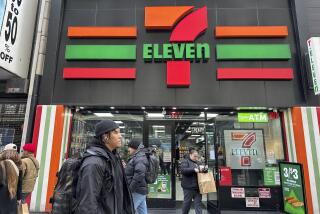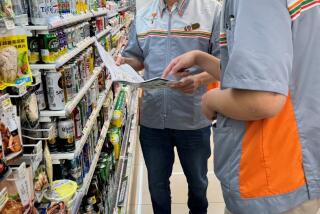Southland Bondholders OK Japanese Bid : Retailing: The enhanced offer lifts a hurdle in restructuring the convenience store chain and could pump new life into the company.
Efforts to sell troubled Southland Corp., parent of the 7-Eleven chain, took a major step forward Monday when the company’s key bondholders accepted an improved buyout offer from Japanese investors.
The agreement in principle appears to clear the main stumbling block for a deal that would be the biggest Japanese investment ever in U.S. retailing. Analysts say the buyout also would pump new life into Southland, which was brought to the verge of collapse by stepped-up competition and $1.8 billion in junk bond debt.
Under the new offer, Ito-Yokado Co. and its Seven-Eleven Japan Co. unit would pay $430 million for 70% of Dallas-based Southland, the nation’s biggest chain of convenience stores. The Thompson family--which has owned or controlled 94% of Southland’s stock since leading a costly buyout three years ago--would wind up with only about 5%.
Holders of bonds and preferred stock would get the remaining 25% of the company. In addition, bondholders would get new securities with an overall face value of $934 million in exchange for their current $1.8 billion in high-interest junk bonds.
Southland said it hopes to complete the deal in mid-August. “This restructuring, coupled with the cash infusion from our partners in Japan, will help ensure that 7-Eleven remains the leader in the competitive convenience store industry,” Clark Matthews, Southland’s chief financial officer, said in a news release.
In March, Southland announced an agreement to sell control of the company to Ito-Yokado, which in 1973 became its first licensee overseas. But bondholders rejected the first proposal as well as a second offer disclosed in June.
Initially, Ito-Yokado proposed paying $400 million for 75% of Southland while giving bondholders 10% of the company and $350 million in securities.
John Gordon, chairman of a committee representing Southland bondholders and preferred shareholders, said the new agreement “is the best that could be achieved.” He said he knows of no opposition to the deal by any investors.
“One way or another, this deal is definitely going to happen,” Gordon said.
The agreement hinges on, among other things, the approval of holders of 95% of each of Southland’s five categories of junk bond debt. In a news release, Clark Matthews, Southland’s chief financial officer, said holders of more than 70% of the company’s senior debt have already indicated their support.
The specter of a Southland bankruptcy was a driving force behind the buyout agreement, which was reached in New York at 9:30 a.m. Southland went into default Monday morning on some of its junk bond debt after failing to make interest payments totaling $69 million in cash and $38 million in securities.
A class-action suit seeking interest payments was filed against Southland Monday in Dallas, but it is not expected to force the company into bankruptcy now that an agreement has been reached with bondholders. A Southland spokeswoman said the company is withholding the interest to protect its liquidity and “financial flexibility.”
Southland’s lead bankers, including Los Angeles-based Security Pacific, have not announced whether they approve of the agreement. The Southland spokeswoman, however, said the banks have been kept “well-informed” about the negotiations.
Ito-Yokado’s Seven-Eleven Japan unit is the biggest operator of convenience stores in Japan, with 3,940 outlets. It also bought 58 7-Eleven stores in Hawaii from Southland last December.
Southland is the parent of a worldwide organization of 12,900 convenience stores.
More to Read
Inside the business of entertainment
The Wide Shot brings you news, analysis and insights on everything from streaming wars to production — and what it all means for the future.
You may occasionally receive promotional content from the Los Angeles Times.










